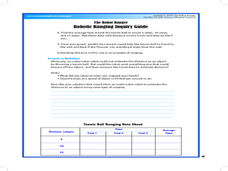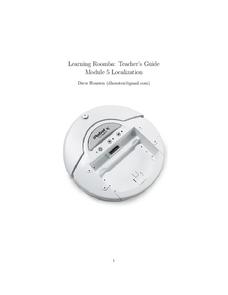Curated OER
Foreshadowing and Prediction: W.W. Jacob's, "The Monkey's Paw"
W.W. Jacobs' story "The Monkey's Paw" provides plenty of foreshadowing which readers use to make predictions in this tightly composed, sound instructional plan. Your class reads the story, recording predictions and checking for veracity...
Drexel University
Learning Roomba Module 1: Robotics Introduction
Introducing Mr. Robot. As an introduction to robotics, class develop a definition of a robot and make distinctions between real robots and those in science fiction. They also study the basics of programming in Java to...
NOAA
Through Robot Eyes
How do robots assist ocean explorers in collecting data and images? The final installment in a five-part series has science scholars examine underwater images collected by robots and identify the organisms shown. Groups then calculate...
Curated OER
My Wet Robot
After hearing about the 2006 PHAEDRA mission that explored the Aegean Sea, middle schoolers work in groups to create a robotic vehicle. They must consider power, propulsion, and other vital systems. Use the multitude of external...
Curated OER
If I Had a Robot
Students study writing. In this creative writing lesson, students write a story about having a robot and make a three-dimensional robot to accompany their writing.
Curated OER
What is a Robot?
Students explore robots. In this robot lesson, students discuss what they know about robots and what kinds of jobs they have seen robots do. Students research robot books, chart their findings and share with the class. Students also...
Curated OER
Robots All Around Us
Student work in design teams to research robots, create a drawing of a robot they want to make, build a prototype of their robot, present their prototype and research, and write a descriptive paragraph about their creation.
Curated OER
The Games Robots Play
Students learn about how robots are programmed to play games. They then construct robot applications (basic computer codes) for playing tic-tac-toe comprised of if-then logic sequences. Students then compete in teams using their...
EngageNY
Motion Along a Line – Search Robots Again
We can mathematically model the path of a robot. Learners use parametric equations to find the location of a robot at a given time. They compare the paths of multiple robots looking for parallel and perpendicular relationships and...
Curated OER
The Roving Robotic Chemist
Junior oceanographers and underwater geologists describe the four major steps of mass spectrometry. They compete in small groups to simulate the tracking of a deepwater methane plume using imaginary autonomous underwater vehicles. Give...
Curated OER
Naturral Born Robots: Robots Have Feelings Too
Students explore robotics. They design a simple device that simulates a human arm lifting a mass. Students test the strength of their arm. Students discuss artificial intelligence.
Drexel University
Learning Roomba Module 4: Sensors and Actuators
Introduce your classes to sensors and actuators in robots — specifically to the Roomba. Pupils develop programs that make Roomba utilize its different sensors.
Curated OER
Robotics
learners identify and research robots in various roles in society, and create robotic arms and multimedia presentation based on their findings.
Curated OER
I, Robot by Isaac Asimov
Students contemplate the questions raised by the book/movie I, Robot. In this theoretical physics lesson, students consider the pros and cons as well as the possibility of robots that can think.
NOAA
Biological Oceanographic Investigations – Call to Arms
How many simple machines does it take to make a robotic arm? An inquiry-based lesson plan explores that topic and challenges pupils to build a robotic arm that can stretch, turn, and more. A few questions help guide them in the...
Curated OER
The Robot Ranger
Students participate in an experiment to understand how robotic systems can estimate distances. In this robotic ranger lesson, students measure the the time it takes for and object to move back and forth. Students will use a...
Curated OER
Call to Arms: Robotic Analogues for Human Structures
Investigate deep sea discovery through the emerging technology being built. In this physical science lesson, students analyze the different types of motion available in the human arm. Students research educational websites...
Curated OER
Call to Arms
Students explore how scientists build robotic arms that move similar to humans. In this robot lesson, students examine how scientists make robots. Students design and construct a mechanical arm that moves like a human arm. Students...
Pennsylvania Department of Education
What is the Chance?
Fourth and fifth graders make predictions using data. In this analyzing data instructional activity, pupils use experimental data, frequency tables, and line plots to look for patterns in the data in order to determine chance. You will...
Curated OER
Automated Intelligence
Students redesign everyday robotic devices to increase their autonomy and their usefulness. Propose ideas that would make directly controlled robotic devices more antonymous and create posters illustrating their ideas.
Curated OER
Snail Car
Students design and create robotic cars using Legos and the Robolab program. They hold a "snail race" where the slowest car that can be determined to be actually moving is the winner.
Drexel University
Learning Roomba Module 3: Controlling Movement
Look at it go. The resource, the third in a series of five using a Roomba, explains the different types of movements a Roomba makes, then challenges pupils to create computer codes that will cause the Roomba to travel specific paths.
PBS
Robo Arm
Future engineers create robotic arms like those on rovers built by NASA in the second instructional activity of the series. They test their devices by attempting to pick up and move cups to a specified location.
Drexel University
Learning Roomba Module 5: Localization
Where is my robot? Pupils create programs that utilize the localization services that a Roomba uses to determine its surroundings.























